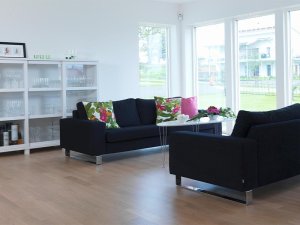Which Luxury Vinyl Flooring Is Better, Glue down or Floating
Once the user has chosen luxury vinyl flooring, they are faced with the additional choice of what type of installation to use for their luxury vinyl flooring, Glue down or Floating.
Although Glue down and Floating represent different installation methods, they also represent different product constructions.
Let us first understand each of the two types of vinyl flooring, as well as their pros and cons. To enable customers to make a better choice.
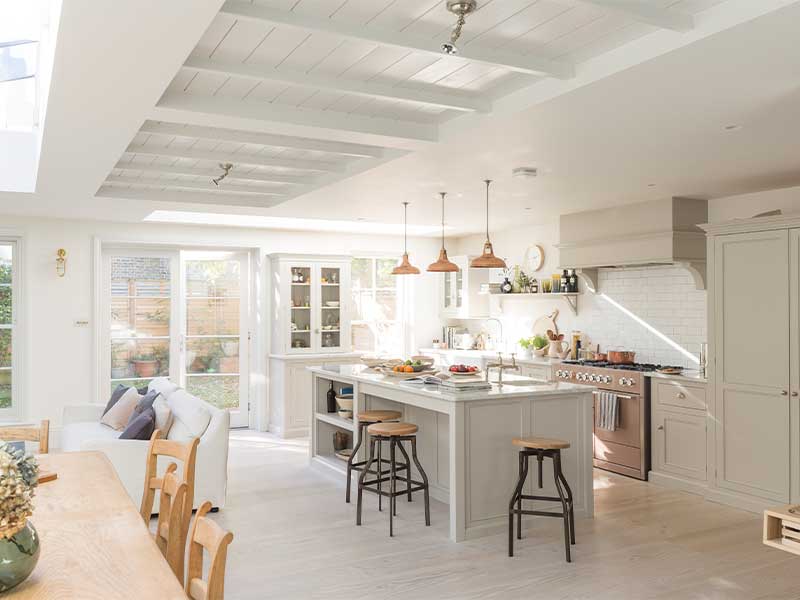
What is Glue down vinyl flooring?
Glue down, as the name implies, is the use of adhesives to install luxury vinyl flooring onto a base. The adhesive ensures that the product is fixed firmly in place, avoiding displacement and voids created by imperfections in the foundation.
The glue down method involves two distinct types of adhesives: hard set and pressure sensitive.
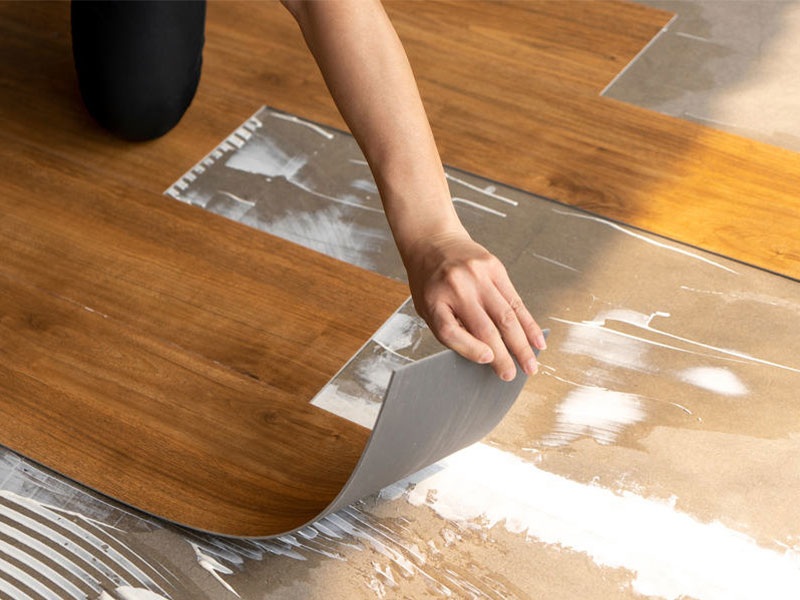
Hard Set
By applying an adhesive to the base floor, the flooring and subfloor are firmly bonded in place. It also prevents the floor from being damaged under the weight of a heavy object such as a home. Hard Set is used in a wide range of flooring installations, not only for luxury vinyl flooring but also for laminate flooring.
Pros
Durable – After correct installation, The hard set planks can stay intact for years with little to no peeling, giving you a great return on your investment. That said, durability will also depend on how well the floor is installed.
Easy repair and maintenance – Compared to interlocking floating planks, glue down flooring is easy to repair and replace. If one plank or tile is faulty, you only need to replace or repair that one without undoing the neighboring planks.
Affordable – Hard-set vinyl flooring is not the cheapest option, but it is also not prohibitively expensive. You will get high-quality planks or tiles at pocket-friendly prices, allowing you to replace or build your new flooring affordably.
Cons
Demanding installation – Installing glue down hard set flooring is more time and effort-intensive compared to other types of vinyl flooring. The process entails leveling the subfloor to near-perfection and applying the hard set glue to the floor using a trowel. A slight imbalance in the floor levelness can easily throw off the entire installation process.
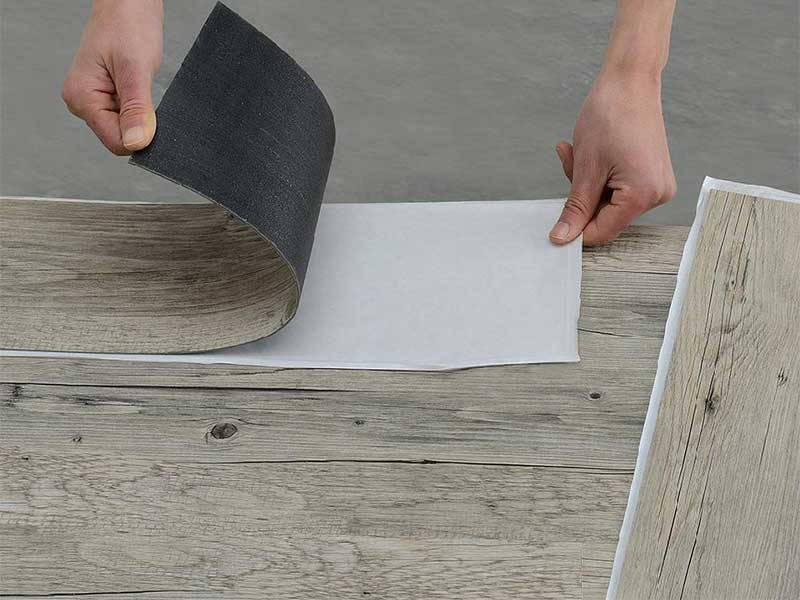
Pressure sensitive(Peel And Stick)
Pressure-sensitive, also known as peel and stick, is the traditional option for glue-down flooring. The plank or tile itself has an adhesive at the back, and installation entails laying down the flooring and applying pressure to adhere. The advantage of pressure-sensitive vinyl flooring is the ease of replacement compared to hard-set vinyl flooring.
Pros
Easy to install – Pressure-sensitive vinyl flooring is perfect for any DIYer. Even without any floor installation experience, you can install this yourself. Very little prep work is needed to get the subfloor ready; if your subfloor is level, you can install your peel and stick flooring immediately.
Budget-friendly – If you want to spruce up your floors without breaking Wallets, pressure-sensitive vinyl flooring is an excellent choice. You can easily change out your entire home’s floor and replace it with peel-and-stick vinyl on a small budget.
Aesthetic appeal – Even though this flooring is just a sticker glued to your subfloor, it looks and feels just like real wood. At first sight, no one can tell the difference. You can enjoy the beauty of hardwood floors on a tight budget.
Easy repair and maintenance – In addition to being easy to install, this vinyl flooring option is easy to repair, waterproof, and low maintenance. If you care for it properly, it can last you a long time as you wait to install permanent flooring.
Cons
Low durability – Peel-and-stick vinyl flooring is mostly a temporary flooring solution. The adhesive can sometimes become weak, causing the flooring to peel off. This mostly happens if the subfloor was not prepared properly. It is a good choice if you are looking to change your existing floor quickly as you plan for a more permanent floor option.
Too Thin – Pressure-sensitive vinyl flooring is the thinnest of all the vinyl flooring types. If there are any imperfections on the subfloor, you will feel them on the surface of the vinyl. It is absolutely important to thoroughly prepare the subfloor before installing glue-down flooring.
What Is Floating Vinyl Flooring?
The floating flooring category encompasses two different products with different installation options: loose lay vinyl and click vinyl flooring. in the past 10-15 years, Floating flooring has always been the best choice for residential and commercial buildings. This “floating” installation method remains a very popular choice today — especially for vinyl flooring.
Depending on the type of floating product, floating installations involve little to no adhesive that can either be installed directly over the subfloor or using a cushion or vapor barrier system.
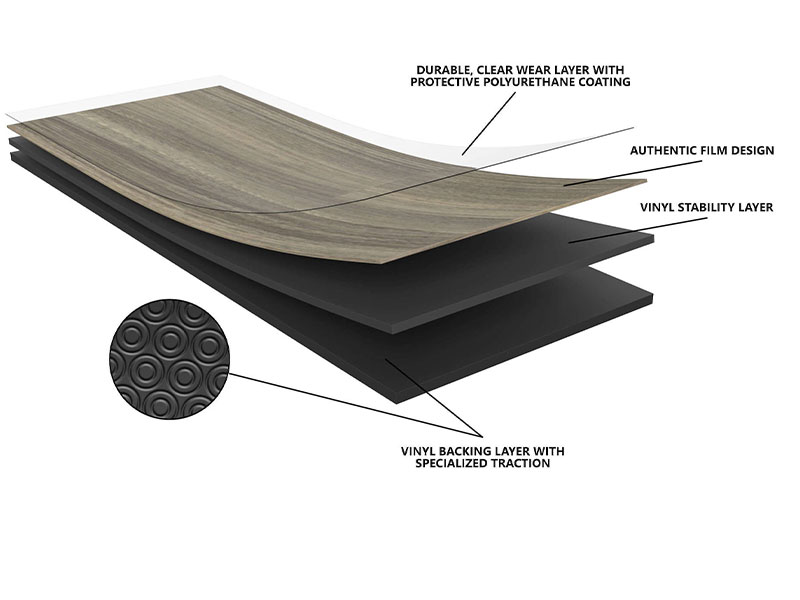
Loose Lay Vinyl Flooring
Just as the name implies, loose lay flooring is loosely laid on top of the subfloor of a space. This floating flooring option makes for an efficient install with beautiful results. Typically commercial loose lay flooring is installed by first gluing down floorings around the perimeter of the space (for smaller areas) or a grid-like adhesive application (for larger spaces), and then loosely laying the remaining planks or tiles. When complete, the planks or tiles will stay in place.
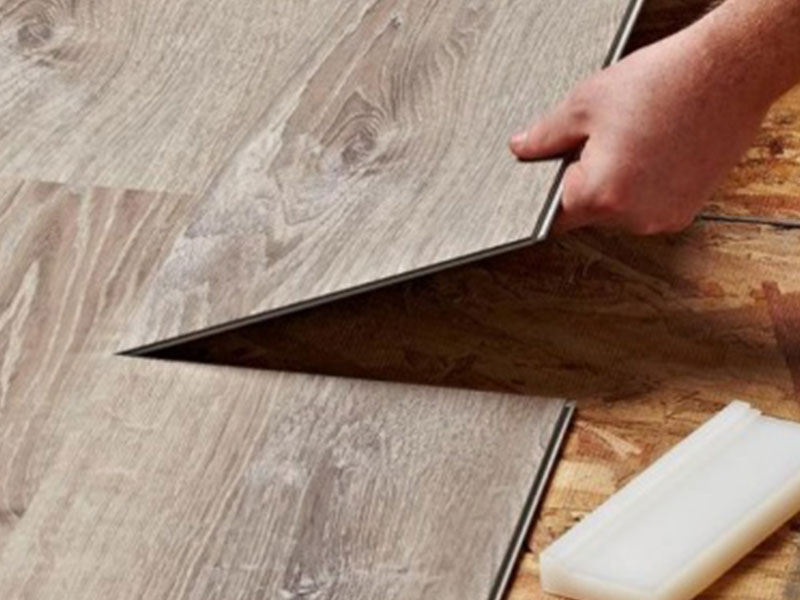
Click Vinyl Flooring
Click vinyl flooring, comprised of rigid core click and click options, is a versatile plank and tile flooring option. To install click flooring, simply snap planks or tiles into place using the click-locking system integrated into the flooring product.
Pros
Easy Installation – The click and lock and loose lay mechanism make for easy installation. With handy skills, installing a floating vinyl planks floor should be fuss-free. Because the planks sit on top of a subflooring, they will still look good and stable on a less than perfectly leveled subfloor.
Durable – Floating vinyl plank flooring comes in thickness sizes of up to 6mm. Because of their thickness, these planks can last for years and still retain their stability and noise-reducing quality. Unlike glue-down vinyl flooring that can sometimes peel after prolonged use, floating floors don’t have issues with peeling and will rarely come apart if installed correctly. This flooring option is also waterproof.
Cons
Repairs can be challenging – Because floating vinyl plank flooring interlocks, repairs can be quite difficult to do. If one plank is problematic, you would have to undo some of the surrounding planks to fix that one plank. The upside is that this type of flooring is hard-wearing and durable, and repairs are far and apart.
Cost – Floating vinyl plank flooring is the most expensive of all the vinyl flooring options. Still, this flooring is affordable, and when you consider all the excellent benefits, you get a return on investment.
Which type should I choose.
For the selection of vinyl flooring, we offer the following points for our customers’ reference.
1, Requirements for service life – If the flooring is to be used for a long time, Floating Vinyl Flooring may be more suitable. The flooring is to be installed in a rented house or if there are frequent changes to the décor, Floating Vinyl Flooring may be a better experience, but at an additional cost, so we recommend Glue down.
2, How large is the space to be installed – Generally speaking, Floating Vinyl Flooring is not suitable for larger areas without any fixings, as the bottom edge may buckle due to a small problem. The planks are stuck to the floor and are less likely to separate.
3, The installation site is susceptible to moisture – Although vinyl flooring is generally water resistant, prolonged moisture can cause the adhesive to fail. You can also install a moisture barrier for extra safety.
4, Room use – Some spaces such as living rooms, function rooms, kitchens, hallways, etc. have high traffic. Here we recommend the glue down and click types of flooring for a solid installation. After all, the lifespan of the flooring is closely related to the amount of traffic, Floating flooring may easily come apart when installed in busy areas, although it offers greater elegance installed in any other part of the house. of the house.
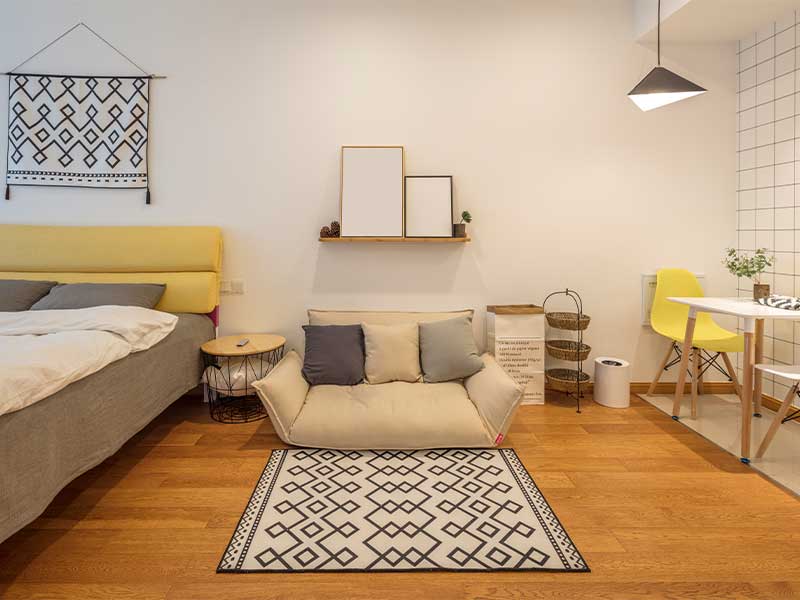
Summary
Every type of flooring has advantages and disadvantages, and what is suitable for use is the right one.
Glue down flooring offer durability and a solid feel underfoot, but installation can be quite demanding.
Peel-and-stick flooring is a great option if you are on a tight budget, are looking for a temporary flooring solution, and don’t mind the sometimes lengthy installation process.
Lastly, floating flooring is easily the most elegant option. It is also relatively easy to install on your own. The price point might be comparably higher, but you do get a return on your investment.


